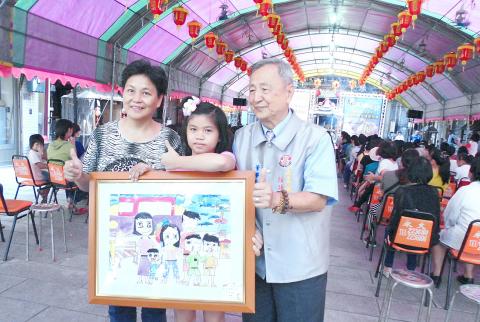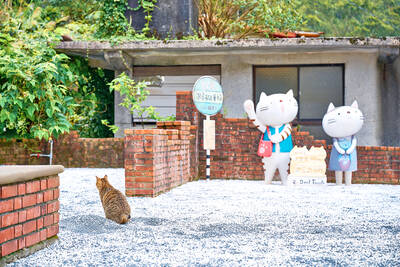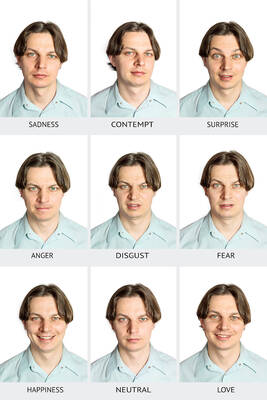Due to family circumstances, Hsu Fang-yu, a fourth-grade student at Chiayi Municipal Ta-tung Elementary School, lives with her grandmother, who makes a living from collecting items for recycling, and her great-grandmother. Hsu likes drawing. By chance, she found some wax crayons among the things her grandmother had collected for recycling, learning by herself, she found something she was very good at. In the third grade at elementary school, she was admitted to a class for artistically gifted children. On Sept. 19 she received a commendation as an “angel in adversity” from the Chiayi Cheng-huang Temple’s charity foundation. Hsu attended the prize-giving activity along with her grandmother and took along a drawing she had done of her whole family. The story of how she has made advances in spite of adversity is quite moving.
Hsu says that her mother looks after her two younger brothers, who are late developers, on her own in Taichung, so she, her 56-year-old grandmother and 93-year-old great-grandmother have to depend on one another. Apart from a military pension, their household income is supplemented by her grandmother’s earnings from recycling. Hsu helps with collecting and sorting things for recycling, and the stationery and drawing materials she uses are picked out from among the recyclables.
The girl’s grandmother, Wang Ching-chung, says that when Hsu gets home she helps by hanging clothes out to dry, bringing them in again and sweeping and mopping the floor. When her great-grandmother goes out, she always walks along with her and gives her a helping hand. Although she lives in a poor household, Hsu is resilient and hardworking, and she is very respectful and obedient. They are lucky to have such a well-behaved little girl, says Wang.
(Liberty Times, translated by Julian Clegg)

Photo: Ting Wei-chieh, Liberty Times
照片:自由時報記者丁偉杰
嘉義市大同國小四年級學生許芳瑜,因家庭因素,跟著從事資源回收的祖母以及曾祖母同住。她喜歡畫畫,無意間從祖母撿回的資源回收物找到蠟筆,靠著自學,畫出一片天,小三考進美術資優班,九月十九日接受嘉義城隍廟慈善會「逆境天使」表揚,許芳瑜與祖母一起出席授獎活動,還帶來一幅「全家福」畫作。逆境向上的故事,讓人感動。
許芳瑜說,因媽媽在台中獨力照顧兩個發展遲緩的弟弟,她必須跟五十六歲祖母,及高齡九十三歲曾祖母相依為命;家裡生活開銷除領榮民撫恤金,另由祖母從事資源回收補貼家用。她會幫忙回收、分類,所用的文具及畫具都是從回收物挑選而來。
祖母王敬忠說,芳瑜放學回家會幫忙曬衣服、收衣服、掃地、擦地;阿祖外出,一定跟前跟後,攙扶阿祖。雖然家境清寒,芳瑜刻苦努力,十分孝順,非常難得。
(自由時報記者丁偉杰)

Nestled in the mountain region of northern Taiwan lies a small village that was once bustling due to a thriving coal industry, only to later gain fame for an entirely different reason — cats. This is Houtong Cat Village (猴硐貓村), located in Ruifang District, New Taipei City. Traditional Coal Mining and Village Transformation Houtong was originally known as “Monkey Cave” (houtong, 猴洞), a name derived from the wild monkeys that once inhabited caves in the surrounding hills. During the Japanese colonial period in the early 20th century, rich coal deposits were discovered and developed, rapidly turning Houtong into one of northern Taiwan’s

People use far more than just spoken language to communicate. Apart from using our voices to pronounce words, we also use body language, which includes countless facial expressions. Most people know that smiles and frowns indicate pleasure and displeasure, or that wide eyes with raised eyebrows typically show surprise. However, there is a lot more to learn about how facial expressions can help or hinder communication. People often unintentionally reveal their emotions through very tiny facial movements known as “microexpressions.” The term was popularized by psychologist Paul Ekman, who found that people from cultures across the world generally recognize

對話 Dialogue 清清:氣象預報說週末好像有寒流,天氣這麼冷,我只想宅在家裡。 Qīngqīng: Qìxiàng yùbào shuō zhōumò hǎoxiàng yǒu hánliú, tiānqì zhème lěng, wǒ zhǐ xiǎng zhái zài jiālǐ. 華華:說到這個,我週末想約剛認識的新朋友出去玩,但寒流來的話戶外活動可能不太合適,我還不知道要做什麼好。 Huáhua: Shuō dào zhège, wǒ zhōumò xiǎng yuē gāng rènshí de xīn péngyǒu chūqù wán, dàn hánliú lái de huà hùwài huódòng kěnéng bú tài héshì, wǒ hái bù zhīdào yào zuò shénme hǎo. 清清:要不要考慮去玩密室脫逃?我以前跟朋友去過,很好玩,而且不怕風吹雨淋。 Qīngqīng: Yào bú yào kǎolǜ qù wán mìshì tuōtáo? Wǒ yǐqián gēn péngyǒu qù guò, hěn hǎowán, érqiě bú pà fēng chuī yǔ lín. 華華:我覺得不錯,可是我們才剛認識,會不會太尷尬? Huáhua: Wǒ juéde búcuò, kěshì wǒmen cái gāng rènshí, huì bú huì tài gāngà? 清清:不會啦!玩密室脫逃需要大家一起合作,反而更容易變熟。 Qīngqīng: Bú huì la! Wán mìshì tuōtáo xūyào dàjiā yìqǐ hézuò, fǎn’ér gèng róngyì

Continued from yesterday(延續自昨日) https://www.taipeitimes.com/News/lang Microexpressions appear quickly and can disappear in the blink of an eye. They typically last only a fraction of a second, yet they reveal a person’s true emotions. Here’s how to recognize the seven microexpressions. Happiness: The corners of the lips move upward and back, lifting the cheeks. Crow’s feet also form near the outside of the eyes. Sadness: The corners of the mouth turn downward, creating a frown. The eyebrows may also draw closer together. Disgust: The muscles around the nose and eyebrows tighten toward the bridge of the nose. The upper lip rises slightly to reveal the teeth. Surprise: